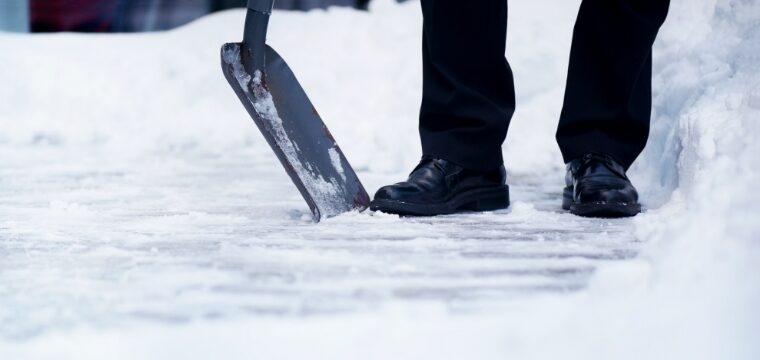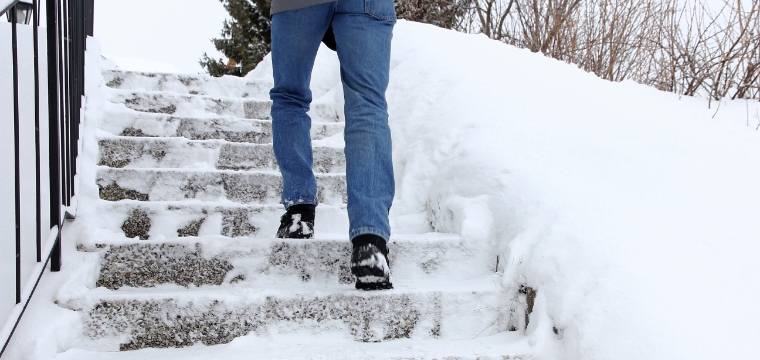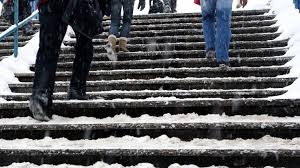Missouri has highly variable weather. One moment the Sun shines — the next, sleet, slush and snow are raining down from the sky. As a result, sidewalks, parking lots and other walking surfaces may soon be unexpectedly covered by snow or ice. At the height of slip and fall season, an icy sidewalk may be a nuanced cause for a personal injury case. Before you talk to a slip and fall attorney, Casey, Devoti & Brockland has outlined the answers to common questions about the laws surrounding sidewalk upkeep during Winter.
Who is responsible for an icy sidewalk?
No one has an absolute duty in Missouri to clear snow from or place salt or sand on an icy sidewalk. The standard is an exception to the general rule directing that municipalities, homeowners and businesses have a non-delegable duty to maintain their sidewalks, parking lots and other walking surfaces; in other words, these landowners cannot delegate maintenance to another entity or individual. As such, local governments, homeowners and businesses do not have an affirmative responsibility to clear frozen precipitation from walking surfaces.
However, landowners may take on responsibility by affirmatively acting as a courtesy to pedestrians. Businesses and public institutions often clear sidewalks and parking lots to ensure their patrons are safe and their buildings stay accessible. When they do so these landowners must act as would an ordinarily careful person in clearing, cleaning and preparing the sidewalk or parking lot for pedestrians.
Are there any exceptions?
Missouri law considers fallen snow and ice an act of God, meaning they are natural occurrences outside human control. Legal responsibility attaches when an “unnatural accumulation” results. A slip and fall attorney can tell you that unnatural accumulation occurs when the snow or ice is moved from the place where it naturally happened to fall.
As such, the landowner takes on responsibility only when the landowner acts in some way . For example, some homeowners clear their driveway of snow and pile it on the sidewalk. The resulting pile would be considered unnatural accumulation — now, the homeowner could be liable if someone injures themself on the pile.
Some businesses clear snow and spread salt on icy sidewalks. While the salt melts any ice initially, it leaves water behind that freezes overnight. The resulting ice would leave businesses liable for an injury case should a customer fail to appreciate the ice and slip while walking across the lot. Since the business owner decided to take on the responsibility of clearing the sidewalk, they would need to manage the upkeep afterward.
Similarly, gutters and downspouts may drain where people walk — since gutters are man-made, a homeowner or business owner may be held liable for any accidents resulting from frozen runoff.
As a slip and fall attorney, we recommend that you keep in mind that a home or business owner is responsible for the work done by services hired to clear the walk or lot. The landowner is ultimately liable for injuries on its property, even if the landowner hired someone else to do the work.
How can homeowners protect themselves?
The most surefire way for homeowners to protect themselves from a slip and fall case is to do nothing. If you leave snow and ice as it naturally accumulates, you cannot be held responsible for the conditions on your property. However, a lack of action is not conducive to being a good neighbor, community member or business owner. Most would prefer to clear a snowy or icy sidewalk so that moving to and from the property is easy.
If you elect to clear your property of snow and ice, a slip and fall attorney may advise that you use ordinary care when clearing surfaces — be sure to remove all snow from walkways and place it a safe distance away to avoid winter weather injuries.
Also, remember that you are also responsible for those you hire. If a teenager asks to remove the snow from your driveway or sidewalk, you may be held responsible for their work. Be sure to check their work afterward — if they mess up, you are on the line for any injuries on your property caused by their failure to use ordinary care in clearing the walking surface.
Contacting a Slip and Fall Attorney
If you have experienced a slip and fall case resulting from an icy sidewalk, you will need a few pieces of evidence to back you up. You will need to provide documentation of the conditions that caused the fall, including photos, the location of where it happened and a description of the event.
Without evidence, you may run into roadblocks — the conditions may fluctuate if you do not document them immediately. If you need legal help after a fall, contact a slip and fall attorney at Casey, Devoti and Brockland for a free consultation.









